Named Lectures
- Chou Wen-Chung Distinguished Lecture on Chinese Culture
- Robert F. Ellsworth Memorial Lecture
- So Kwan Lok Distinguished Lecture on China
- Susan Shirk Lecture on U.S.-China Relations
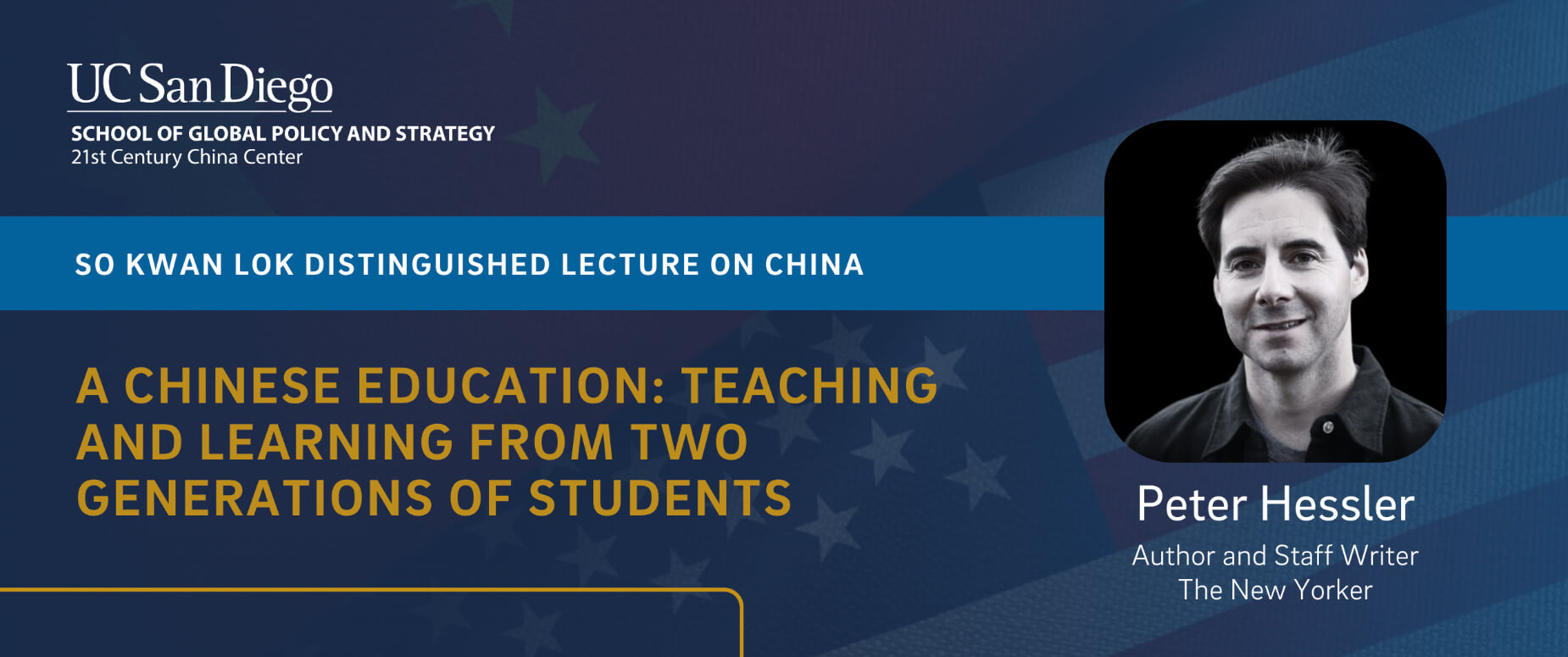
21st Century China Center founder and GPS International Advisory Board member Kwan So established this forum as a touchstone of his passion to foster greater U.S. and China understanding. The So Kwan Lok Distinguished Lecture Series, which predates the 21st Century China Center, brings top leaders and thinkers from China and elsewhere to offer front-line insights and analysis of the most pressing economic and political trends in China and U.S.-China relations.
Nov. 26, 2024, 4-5:30 p.m.
In 1996, Peter Hessler was sent as a Peace Corps volunteer to Fuling, a small city on the Yangtze. Almost all of his students had grown up in rural homes, often in poverty, and usually they were the first members of their extended family to enter higher education.
After teaching for two years, Hessler wrote his first book, “River Town,” and he became The New Yorker’s Beijing correspondent. For more than two decades, he stayed in close touch with his former students, observing how they negotiated China’s Reform era. In 2019, Hessler returned to teach again in the same region, at Sichuan University. In the classroom he met members of the next generation of students, almost all of whom had grown up in urban middle-class homes that had been restricted to a single child. While teaching, Hessler also revisited Fuling and the people he had taught in the 1990s, an experience that helped him gain a new perspective on China’s transformation.
Speaker:
Moderator:
Peter Hessler is a writer of narrative nonfiction and the author of six books. In 1996, he joined the Peace Corps, which sent him to Fuling, a small city in southwestern China. For two years, he taught English and American literature at Fuling Teachers College, an experience that eventually became the subject of his first book, “River Town,” which was published in 2001. This book was followed by two others about China: “Oracle Bones” (2006), and “Country Driving” (2010), all of which became New York Times bestsellers.
Together, these books comprise Hessler’s “China trilogy,” covering the decade in which he lived in the country. During this period, China underwent enormous change, and Hessler recorded the moment through observing average citizens.
For the most part, he avoided writing about the famous and the powerful, instead focusing on farmers, factory workers, students, teachers, traders and small entrepreneurs. Most of his subjects reflected two key social dynamics of this era: the mass migration from the countryside to cities, and the tens of millions of Chinese individuals who were now becoming members of the new middle class.
Since 2000, Hessler has been a staff writer at The New Yorker, and he is also a contributing writer at National Geographic Magazine.
This series brings top leaders and thinkers from China, drawing audiences from the academy and beyond to hear front-line insights and analysis of the most pressing trends in China.
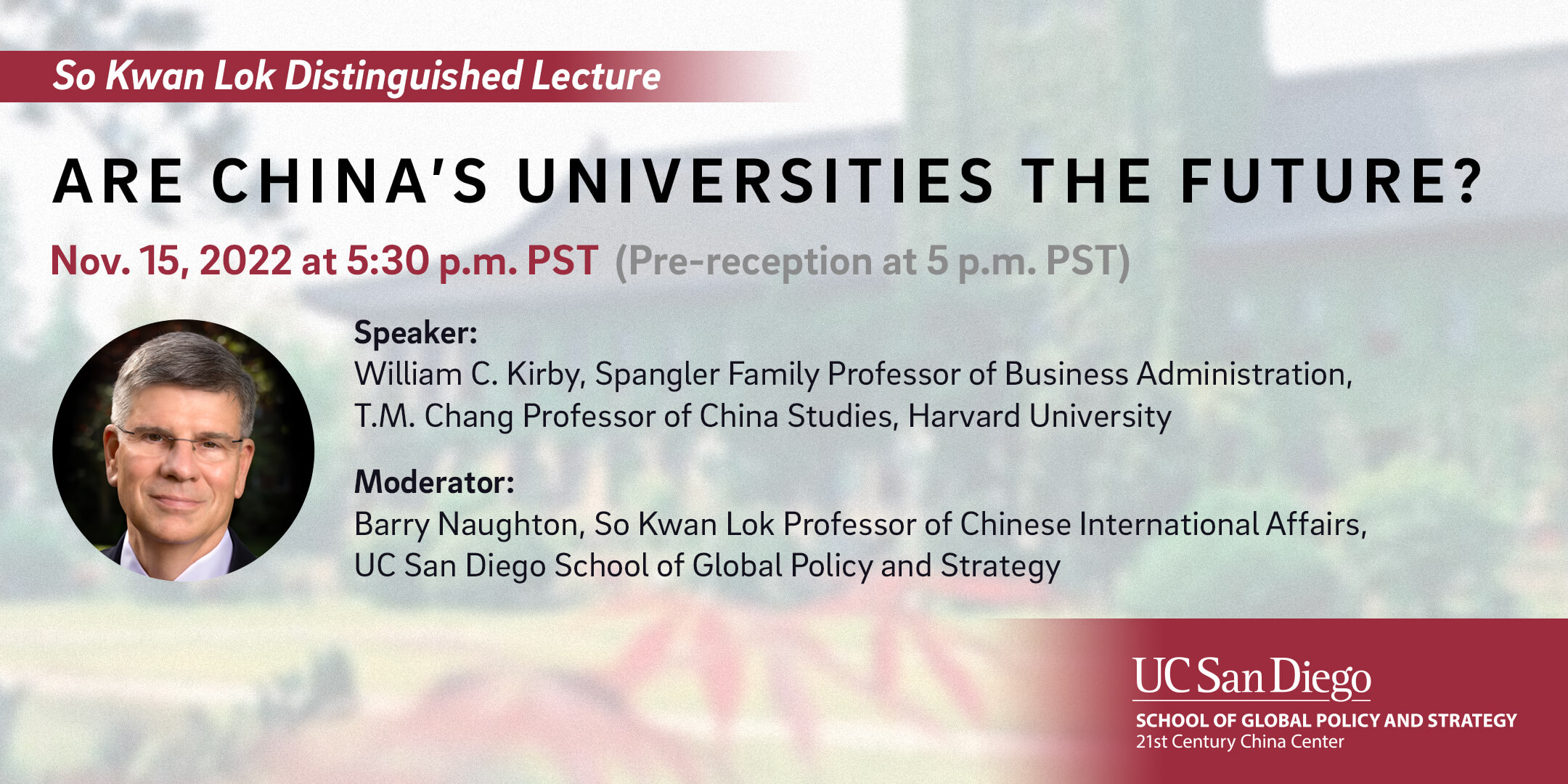
Nov. 15, 2022
The modern university was born in Germany. In the 20th century, the U.S. leapfrogged Germany to become the global leader in higher education. Will China challenge its position in the 21st century? William Kirby examined the successes of leading universities in the three countries and their threats and challenges. This talk is based on his new book “Empires of Ideas,” which looks to the past 200 years for answers, chronicling two revolutions in higher education: the birth of the research university and its integration with the liberal education model. Kirby is the 10th presenter of the So Kwan Lok Distinguished Lecture, a series established by the 21st Century China Center to honor its founding member, board adviser and long-time supporter So Kwan Lok (Kwan So).
Speaker:
Moderator:
William C. Kirby is T.M. Chang Professor of China Studies at Harvard University and Spangler Family Professor of Business Administration at Harvard Business School. He is a University Distinguished Service Professor. Professor Kirby serves as Chairman of the Harvard China Fund and Faculty Chair of the Harvard Center Shanghai. At Harvard, he has served as director of the Fairbank Center for Chinese Studies, chair of the History Department and dean of the Faculty of Arts and Sciences. His current projects include case studies of trend-setting Chinese businesses and a comparative study of higher education in China, Europe and the U.S. His recent books include “Can China Lead?” (Harvard Business Review Press) and “China and Europe on the New Silk Road” (Oxford University Press). His latest book is “Empires of Ideas: Creating Modern Universities from Germany to America to China” (Harvard University Press).
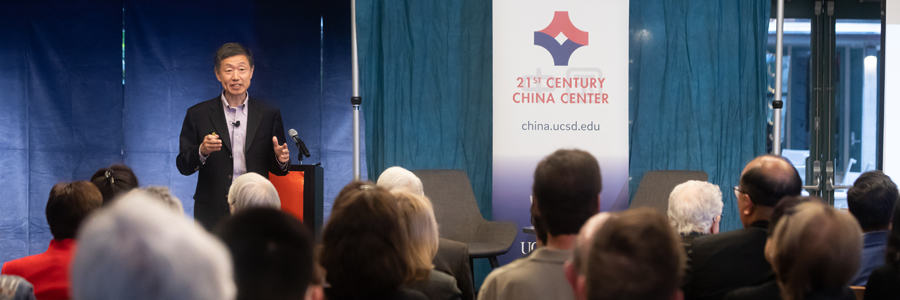
2020 So Kwan Lok Distinguished Lecture on China
Speaker: Weijian Shan, chairman and CEO of PAG
Date: Mar. 9, 2020
Time: 4-5:30 p.m.
Location: UC San Diego Campus, Faculty Club
In the ninth So Kwan Lok Distinguished Lecture on China, Weijian Shan, economist, investor and best-selling author will share his odyssey of living through the trauma and turmoil of Mao’s Cultural Revolution to become one of Asia’s most successful financiers. Combined with his experience as a professor at the Wharton School and a leading investor, his background gives him a unique perspective on China and the U.S. Shan’s story is one of courage, hope and perseverance to dream of a better future in dismal circumstances.
Weijian Shan is chairman and CEO of PAG, a private equity firm. Prior to PAG, he was a partner of TPG and co-managing partner of TPG Asia. He led a number of landmark transactions including the acquisitions of Korea First Bank and China’s Shenzhen Development Bank, both of which made his investors billions of dollars in profits and were made into case studies of Harvard Business School. He holds an M.A. and a Ph.D. from UC Berkeley, and an M.B.A. from the University of San Francisco. He studied English at Beijing University of International Business and Economics, where he also taught as a faculty member. He received no formal secondary education.
Reflections of a harrowing journey through China's turbulent revolution
March 19, 2020 | By Virginia Watson | GPS News
At the 2020 So Kwan Lok Distinguished Lecture on China, economist, investor and author Weijian Shan shared his odyssey of living through the turmoil of Mao’s Cultural Revolution and his path to becoming a successful financier
Speaker: Joe Tsai, co-founder and executive vice chairman of Alibaba Group
Date: Feb. 14, 2019
Time: 5-6:30 p.m.
Location: UC San Diego Campus, Faculty Club
With the United States as the world’s dominant power and China as the world’s rising power, we are poised to enter a period of profound geopolitical and geoeconomic transformation. Joe Tsai, co-founder and executive vice chairman of Alibaba Group, offered his unique insights into the elements that will shape this change, highlighting one of the most important international relationships of our time.
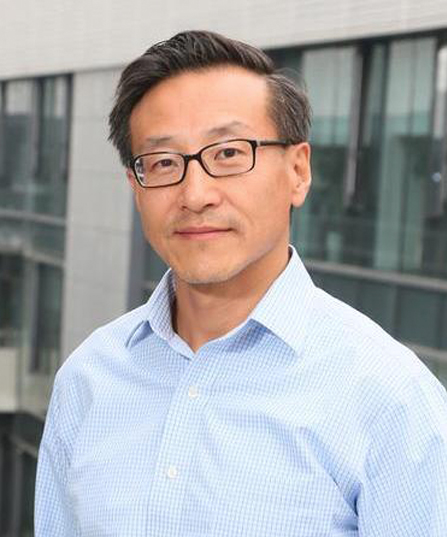
Joe Tsai joined Alibaba Group in 1999 as a member of the founding team and has served on the board of directors since its inception. He was chief financial officer until 2013 and is currently executive vice chairman of the company. He serves on the investment committees of Alibaba Group and Ant Financial and is a founding member of Alibaba Partnership. From 1995 to 1999, Tsai was a private equity investor based in Hong Kong with Investor AB, the main investment vehicle of Sweden's Wallenberg family. Prior to that, he was general counsel of Rosecliff, Inc., a management buyout firm based in New York. From 1990 to 1993, Tsai was an associate attorney in the tax group of Sullivan & Cromwell LLP, a New York-based international law firm. Tsai is qualified to practice law in the State of New York. He received his bachelor’s degree in economics and East Asian Studies from Yale College and a juris doctor degree from Yale Law School.
U.S.-China Symbiosis in the 21st Century?
March 12, 2019 | China Focus Blog
On Feb. 14, 2019, the 21st Century China Center hosted Joe Tsai, co-founder and executive vice chairman of Alibaba Group, to discuss the future of U.S.-China relations at the center’s annual So Kwan Lok Distinguished Lecture on China.
U.S.-China symbiosis takes hold
Feb. 28, 2019 | By Rachel Hommel | GPS News
Alibaba co-founder Joe Tsai paints the landscape for 21st century competition and cooperation between the U.S. and China at the 2019 So Kwan Lok Distinguished Lecture
Speaker: Francis Fukuyama, Olivier Nomellini Senior Fellow, Freeman Spogli Institute for International Studies (FSI) and Mosbacher Director, Center on Democracy, Development, and the Rule of Law
Date: Jan. 29, 2018
Time: 4-5:30 p.m.
Location: UC San Diego Campus, The Great Hall
China's model of state-led development differs both from Western approaches and also from its East Asian neighbors' industrial policies by focusing single-mindedly on infrastructure investment. This strategy was pursued both inside China and is the basis for its ambitious "One Belt, One Road" initiative.
In the seventh Sokwanlok Distinguished Lecture on China, Francis Fukuyama, who has written widely on issues in development and international politics, focused on the economic logic, functioning, and vulnerabilities of this approach to development in this lecture.
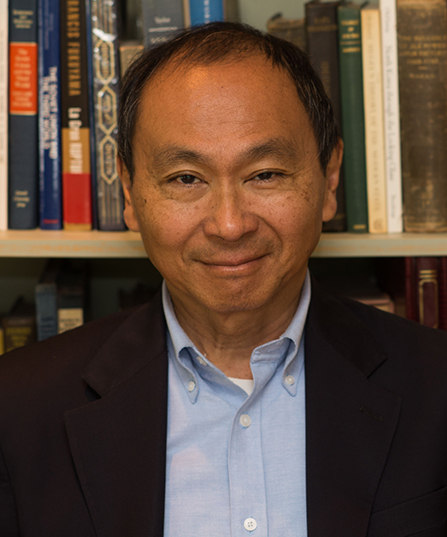
Francis Fukuyama is Olivier Nomellini Senior Fellow at the Freeman Spogli Institute for International Studies (FSI), and the Mosbacher Director of FSI's Center on Democracy, Development, and the Rule of Law at Stanford University, where he is also a professor of political science.
Dr. Fukuyama has written widely on issues in development and international politics. His book, The End of History and the Last Man, was published by Free Press in 1992 and has appeared in over twenty foreign editions. His most recent book, Political Order and Political Decay: From the Industrial Revolution to the Globalization of Democracy, was published in September 2014.
Read his full bio online.
China’s infrastructure investment as a development strategy
Feb. 28, 2018 | By Rachel Hommel | GPS News
GPS’s 21st Century China Center welcomed Francis Fukuyama for the annual So Kwan Lok Distinguish Lecture Series
In this China 21 Podcast, Francis Fukuyama and Barry Naughton trace the origins of the Chinese state, its historic economic modernization, and how the current Xi Jinping era is challenging assumptions and theories about political order and decay.
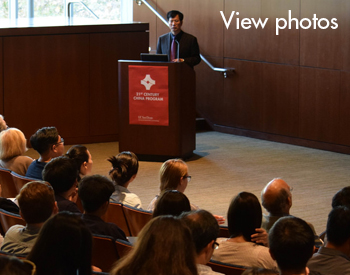
Speaker: Pacific Leadership Fellow YU Keping, Dean, School of Government, Peking University
Date: Oct. 10, 2016
Time: 4:30-6 p.m.
Location: Sanford Consortium for Regenerative Medicine
YU Keping, a renowned scholar and advocate of reform in China addressed the great changes in governance since the economic reform. He traced the principal lines of governance reform in China since the 18th Party Congress and assessed the main challenges going forward.
 Pacific Leadership Fellow YU Keping is the dean of the School of Government at Peking University. He has continued to be a stable voice in Chinese academia, as well as a strong advocate for democratization and rule of law from within the establishment—his book “Democracy is a Good Thing (2009)” relaunched an intellectual debate on the future of China’s political system and democratization.
Pacific Leadership Fellow YU Keping is the dean of the School of Government at Peking University. He has continued to be a stable voice in Chinese academia, as well as a strong advocate for democratization and rule of law from within the establishment—his book “Democracy is a Good Thing (2009)” relaunched an intellectual debate on the future of China’s political system and democratization.
Read his full bio online.
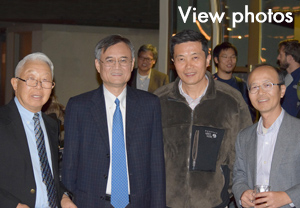
Speaker: Qian Yingyi (钱颖一), Professor, Department of Economics and Dean, School of Economics and Management, Tsinghua University
Date: Dec. 8, 2015
Time: 5-7 p.m.
Location: UC San Diego Faculty Club, Atkinson Pavilion
As China's economic growth rate has declined to 7.5% in 2014 from its recent historic average of 9.8%, the once unstoppable economy is said to have entered a “new normal.” This new paradigm is forcing China's leaders to face a series of new and vexing questions: How to increase the quality of growth and make substantive reforms to the growth model? What will be the spillover effects of this slower growth? Yingyi, one of China's foremost economists, helped navigate the future of China's economy during this talk.
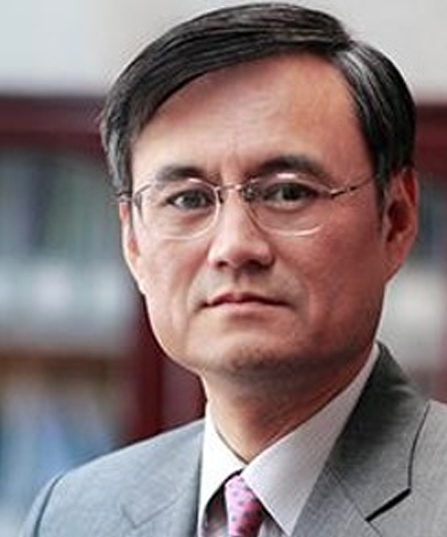 Speaker Bio
Speaker BioQian Yingyi (钱颖一) was born in Beijing and graduated from Tsinghua University with a degree in mathematics in 1981. He received his Ph.D. in economics from Harvard University after earning an M.Phil. in management, science, operations research from Yale University and an M.A. in statistics from Columbia University. He was on the faculty at Stanford University, the University of Maryland and UC Berkeley. He was appointed as the dean of the School of Economics and Management at Tsinghua University in October 2006.
1998: WANG Gungwu, East Asian Institute, National University of Singapore
2000: HUANG Renwei, Institute of International Economics, Shanghai Academy of Social Sciences
2001: JIANG Xiaojuan, Institute of Finance and Trade Economics, Chinese Academy of Social Sciences
2005: SHEN Dingli, Center for American Studies, Fudan University
2006: WU Jinglian, Development Research Centre of the State Council of P.R.C.